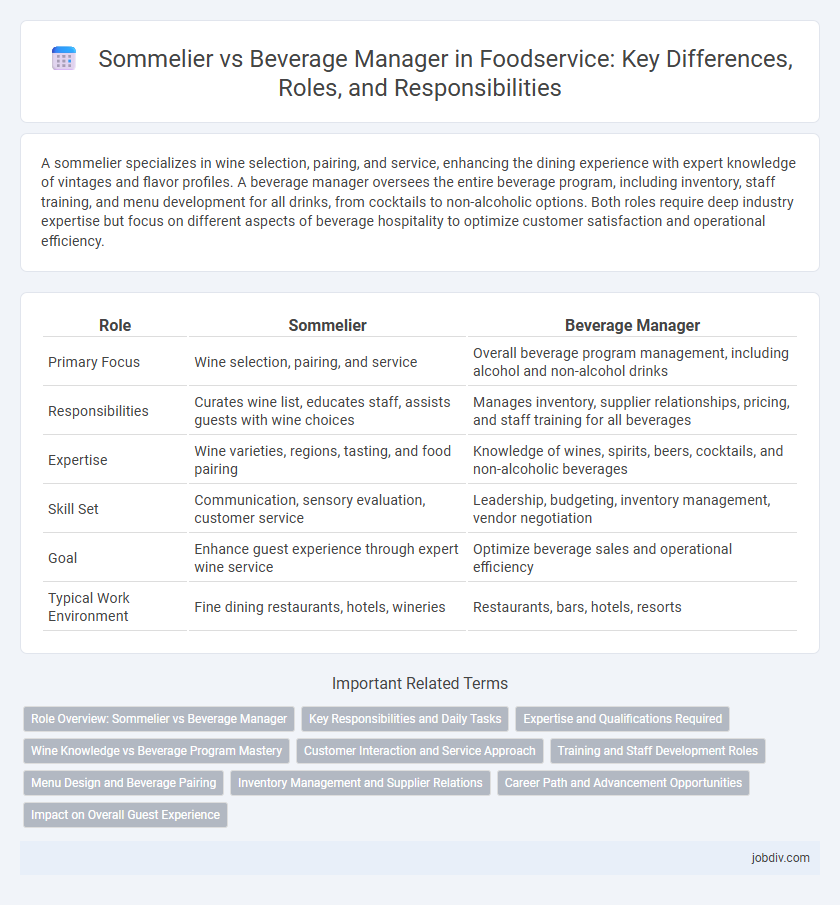A sommelier specializes in wine selection, pairing, and service, enhancing the dining experience with expert knowledge of vintages and flavor profiles. A beverage manager oversees the entire beverage program, including inventory, staff training, and menu development for all drinks, from cocktails to non-alcoholic options. Both roles require deep industry expertise but focus on different aspects of beverage hospitality to optimize customer satisfaction and operational efficiency.
Table of Comparison
| Role | Sommelier | Beverage Manager |
|---|---|---|
| Primary Focus | Wine selection, pairing, and service | Overall beverage program management, including alcohol and non-alcohol drinks |
| Responsibilities | Curates wine list, educates staff, assists guests with wine choices | Manages inventory, supplier relationships, pricing, and staff training for all beverages |
| Expertise | Wine varieties, regions, tasting, and food pairing | Knowledge of wines, spirits, beers, cocktails, and non-alcoholic beverages |
| Skill Set | Communication, sensory evaluation, customer service | Leadership, budgeting, inventory management, vendor negotiation |
| Goal | Enhance guest experience through expert wine service | Optimize beverage sales and operational efficiency |
| Typical Work Environment | Fine dining restaurants, hotels, wineries | Restaurants, bars, hotels, resorts |
Role Overview: Sommelier vs Beverage Manager
A sommelier specializes in wine selection, pairing, and service, enhancing the dining experience with expert knowledge of wine regions, varieties, and tasting profiles. A beverage manager oversees the entire beverage program including inventory, procurement, staff training, and cost control across all drink categories such as beer, spirits, cocktails, and wine. Both roles require strong communication skills and industry expertise, but the sommelier's focus is more on guest interaction and wine education, while the beverage manager concentrates on operational efficiency and profitability.
Key Responsibilities and Daily Tasks
A Sommelier specializes in wine selection, pairing, and education, ensuring an exceptional beverage experience through expert knowledge of wine regions, vintages, and tasting notes. A Beverage Manager oversees the entire beverage program, including inventory control, supplier negotiations, staff training, and budgeting to maximize profitability and operational efficiency. Daily tasks for Sommeliers include conducting tastings and advising guests, while Beverage Managers focus on ordering, maintaining compliance, and analyzing sales data.
Expertise and Qualifications Required
Sommelier roles demand in-depth wine knowledge, certifications like Court of Master Sommeliers, and sensory evaluation skills essential for wine pairings. Beverage Managers require broader expertise in managing diverse drink inventories, staff supervision, and often hold certifications such as Certified Beverage Executive (CBE). Both positions demand strong customer service abilities, but Sommeliers specialize in wine expertise while Beverage Managers emphasize operational management.
Wine Knowledge vs Beverage Program Mastery
A sommelier specializes in in-depth wine knowledge, including varietals, regions, pairings, and wine service techniques to enhance the dining experience. In contrast, a beverage manager oversees the entire beverage program, managing inventory, vendor relationships, cost control, and staff training across all drink categories. Expertise in wine is critical for sommeliers, while beverage managers require a broader mastery of operational and strategic aspects of beverage service.
Customer Interaction and Service Approach
A sommelier specializes in personalized wine recommendations and enhances the dining experience through detailed knowledge of wine pairings and flavors, directly engaging with customers to elevate their meal. A beverage manager oversees the entire beverage program, ensuring quality control, inventory management, and consistent service standards, often interacting with customers in broader service contexts. Both roles prioritize customer satisfaction but differ in focus: the sommelier hones in on expert beverage guidance, while the beverage manager balances operational efficiency with guest experience.
Training and Staff Development Roles
Sommelier roles emphasize specialized training in wine knowledge, tasting techniques, and food pairing to elevate guest experience, while beverage managers focus on broader staff development including inventory management, mixology training, and compliance with health regulations. Sommeliers typically receive formal certification through institutions like the Court of Master Sommeliers, whereas beverage managers often oversee cross-training programs to enhance team versatility and operational efficiency. Both roles contribute to staff development but differ in scope, with sommeliers honing niche expertise and beverage managers fostering overall beverage service excellence.
Menu Design and Beverage Pairing
A sommelier specializes in wine selection and expert beverage pairing tailored to enhance specific food items on the menu, ensuring a harmonious dining experience. Beverage managers oversee the entire beverage program, including inventory control, staff training, and crafting diverse menus that balance wine, beer, spirits, and non-alcoholic options. Effective menu design integrates a sommelier's knowledge to highlight optimal pairings while beverage managers focus on operational logistics and overall beverage variety to meet customer preferences.
Inventory Management and Supplier Relations
A sommelier specializes in wine selection, ensuring inventory reflects quality and seasonality while maintaining relationships with niche suppliers to source rare vintages. Beverage managers oversee a broader inventory, including spirits, beer, and non-alcoholic drinks, optimizing stock levels across multiple categories for cost efficiency and variety. Both roles require strong supplier negotiation skills and inventory tracking systems to minimize waste and maximize profitability.
Career Path and Advancement Opportunities
A Sommelier specializes in wine knowledge and service, often advancing through certifications from the Court of Master Sommeliers to positions as Head Sommelier or Restaurant Manager. A Beverage Manager oversees all beverage operations, including inventory, staff training, and budgeting, with career growth leading to roles such as Director of Beverage or Corporate Beverage Manager. Both paths offer advancement opportunities in upscale restaurants, hotels, and hospitality groups, with potential crossover depending on expertise in wine and beverage program management.
Impact on Overall Guest Experience
A sommelier enhances the overall guest experience by expertly curating wine pairings tailored to individual palates, elevating meal enjoyment and creating memorable dining moments. Beverage managers optimize the entire drink program, overseeing inventory, staff training, and cost control to ensure consistent quality and efficient service. Both roles significantly influence guest satisfaction but address different aspects of the beverage experience, combining expertise to deliver a seamless and elevated foodservice environment.
Sommelier vs Beverage Manager Infographic

 jobdiv.com
jobdiv.com